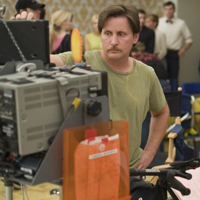Interview: Emilio Estevez

Emilio Estevez was only a child when Robert F. Kennedy was shot in the kitchen of the Ambassador hotel. However, some of his earliest memories were of his parents’ sadness following that event. Nearly 40 years later, Estevez has crafted the film Bobby, centered on an ensemble of characters in the hotel on the fateful day. His hope is to create a portrait of an important era for this generation.
“I think it’s a reminder of a time when we had leaders who were more interested in their message than their sound bytes, and were more interested in speaking from the heart,” said Estevez. “I don’t know if any of you have read Joe Klein’s new book ‘Politics Lost,’ but it’s extraordinary, in the first chapter, I think it’s not even the chapter, I think it’s the Preface, he talks about Bobby Kennedy’s off-the-cuff speech that he gave in Indianapolis the night that Martin Luther King was shot. That he talked from his heart, that he had a series of notes and he just crumpled them up, and he quoted Lincoln and Shakespeare. It was to a largely black audience, about a thousand people who surprisingly had not heard the news that Rev. King had been shot, and that night it was the only major city in America that didn’t experience rioting. And they attribute that to Bobby being there, and they attribute that to him speaking from his heart, and that audience that he spoke to knew it, and I think that we’re lacking that now. We need to risk, we need to dare to risk and fail greatly because that’s the only way we grow.”
In a modern day political cause, Estevez endeavored to shoot in the actual Ambassador hotel, while it was still around. “Five days, all the exteriors with the exception of the two café scenes, that was still intact. But the circumstances were extreme, they were tearing it down, and they were tearing it down around us, and there were some shots if you were to widen out, the school bus scene in particular, you would actually see the bulldozers working, and the agreement was that they would not stop demolition while we were there. Didn’t matter if we were in the middle of a dialogue scene, because they worked around the clock, 24/7 Monday through Sunday. To get those five days and to have the actors stand on that hallowed ground, I think they carried that sentiment with them to every location that we used after the fact to cobble the hotel together.”
It actually caused a bit of family strife, as Martin Sheen was lobbied to turn the hotel into a school. “In the spirit of RFK for sure, and I was trying to save it, and I was trying to get in there and do whatever I could to preserve it, selfishly, but in the spirit of RFK, yes, it should be turned into a school. Ethel Kennedy called my father, and when Ethel Kennedy calls, she’s a tough one to say no to. So he basically called the City Council members, and members of the L.A School Board, and said, ‘I’m calling on behalf of Ethel Kennedy, and the family of Bobby Kennedy, and we think this building should be razed.’ My mom heard about it and she said, ‘Are you insane? Do you know what you’re son is trying to do? He’s trying to get in there and shoot, and it’s such historical relevance.’ He says, ‘Well, well, uh, uh, uh,’ he hemmed and hawed and stammered for a moment, but it was pretty hilarious.”
Aside from obtaining the Ambassador as a location, Estevez had other period details to worry about. “You always sweat that out. You want to get it right, because if you don’t, you marginalize it. And you look at 1968 and it was truly the year that shook the world. The world was really completely upside down. And so, it was incumbent upon us to get it right. So, I leaned on everyone. I leaned on my production designer, I leaned on Julie Weiss our costumer, our DP. These were all brilliant individuals who brought the best of themselves to a very, very limited budget. We started with a budget of 5.5, which was an impossible task, because I wanted the scope of the film to be very big. So, often times I’d be standing with the cinematographer and I’d say, ‘I want this!’ And I’d look over and he’d say, ‘Uh uh.’ ‘I want this.’ And he’d say, ‘Uh uh.’ ‘I want this?’ And he’d say, ‘That’s more like it.’ But with a cast this big and a story this big and a canvas truly this big to want to paint, it needed to be big. So, we had to substitute imagination for a lack of funds.”
Bobby opens Friday.
CINEMABLEND NEWSLETTER
Your Daily Blend of Entertainment News
Most Popular







